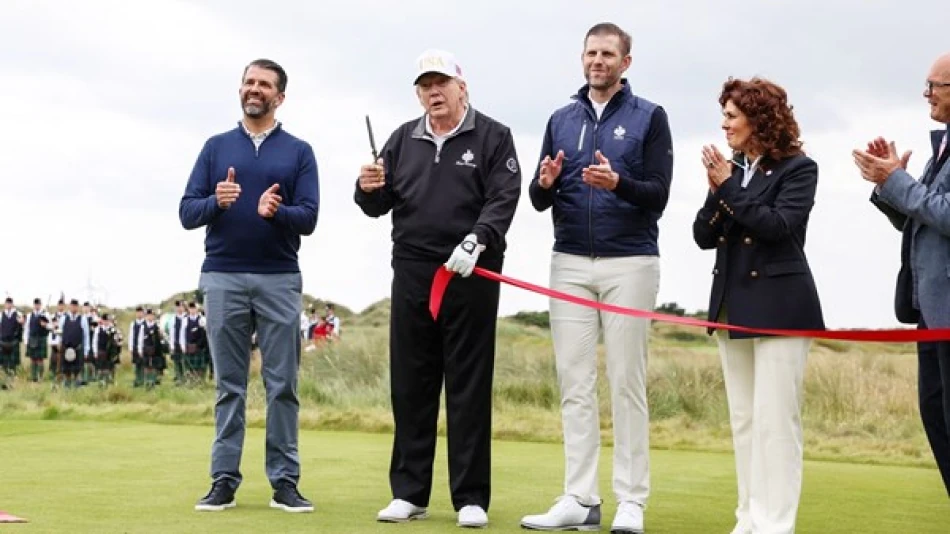
Trump Inaugurates Golf Course in Scotland, Concluding Overseas Visit
Trump Wraps Up Scotland Visit with Golf Course Opening and Strategic Diplomatic Moves
President Donald Trump concluded a carefully orchestrated diplomatic visit to Scotland on Tuesday by inaugurating a new golf course at his Trump International Golf complex in Balmedie. The brief trip combined business interests with high-stakes diplomacy, featuring separate meetings with European Commission President Ursula von der Leyen and British Prime Minister Keir Starmer that yielded significant policy announcements.
A Presidential Ribbon-Cutting with Global Implications
Trump personally cut the ribbon at the new course, flanked by his sons Donald Jr. and Eric, in a ceremony attended by Scottish First Minister John Swinney. The optics were unmistakable: a U.S. president leveraging his business empire as a diplomatic venue while projecting confidence about America's global role.
"This is fantastic. I'm looking forward to playing today. We'll have a quick round and then I'm back to Washington where we'll put out fires wherever they are in the world," Trump told guests, signaling his administration's interventionist approach to international crises.
The new course, described in promotional materials as featuring "the world's largest fortified natural shelter," incorporates sand dunes and green spaces overlooking the North Sea. Its environmentally conscious design reflects growing pressure on luxury developments to demonstrate ecological responsibility—a notable shift for Trump properties historically criticized by environmental groups.
Golf Course Diplomacy: A Calculated Strategy
Trump's choice to conduct serious diplomatic business at his Scottish golf properties represents a deliberate break from traditional summit protocols. Unlike formal White House meetings or neutral venues, the informal setting at Turnberry—where he hosted both European leaders over the weekend—creates a more relaxed atmosphere that can facilitate breakthrough negotiations.
The EU Trade Deal: Pragmatic Compromise
The agreement with von der Leyen to impose 15% U.S. tariffs on European goods marks a significant recalibration of transatlantic trade relations. This rate represents a middle ground between Trump's previous threats of punitive tariffs exceeding 25% and the EU's preference for tariff-free trade.
For European exporters, the 15% rate provides certainty after years of trade war uncertainty, allowing businesses to adjust pricing and supply chains accordingly. American consumers will likely see modest price increases on European imports, from German automobiles to French wines, but the predictable rate structure should prevent the market volatility that characterized Trump's first-term trade policies.
Gaza Commitment Signals Middle East Pivot
Trump's pledge to increase support for Gaza during his meeting with Starmer suggests a more nuanced approach to Middle East policy than his previous administration's strongly pro-Israel stance. This shift likely reflects changing American public opinion on Palestinian issues and the Biden administration's efforts to balance regional relationships.
The timing is strategic: with ongoing humanitarian concerns in Gaza and pressure from European allies for a more balanced approach, Trump appears to be positioning himself as a pragmatic dealmaker rather than an ideological partisan.
Business and Politics: The Trump Model
The Scotland visit exemplifies Trump's unique approach to presidential diplomacy, where his business interests and political objectives intersect. Unlike previous presidents who placed assets in blind trusts, Trump continues to actively promote his properties while conducting official business.
This model offers both advantages and risks. The informal setting can break down diplomatic barriers and create personal relationships that facilitate deal-making. However, it also raises questions about conflicts of interest and whether foreign leaders feel pressured to patronize Trump properties to gain favorable treatment.
For Scotland, hosting these high-profile diplomatic meetings provides significant soft power benefits, positioning the country as a bridge between America and Europe despite Brexit complications. The economic impact on local tourism and hospitality sectors from such presidential visits can be substantial, though it comes with massive security costs.
Looking Ahead: Implications for Global Markets
The concrete outcomes from Trump's Scottish diplomacy will likely influence currency markets, with the euro potentially strengthening against the dollar as trade uncertainty diminishes. European exporters in sectors like automotive, luxury goods, and technology should see more stable planning horizons, even with the new tariff structure.
The Gaza commitment may signal broader shifts in U.S. Middle East policy that could affect energy markets and regional stability calculations. Defense contractors and humanitarian organizations should monitor implementation details closely.
Trump's successful use of his golf properties as diplomatic venues may encourage other world leaders to adopt similar informal approaches, potentially reshaping how international negotiations are conducted in an era where personal relationships increasingly drive policy outcomes.
Most Viewed News

 Layla Al Mansoori
Layla Al Mansoori






